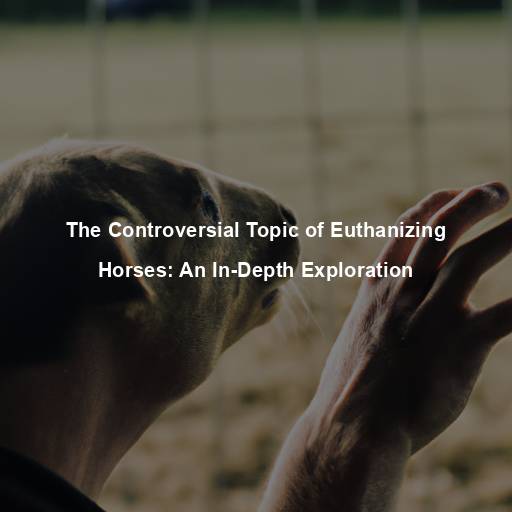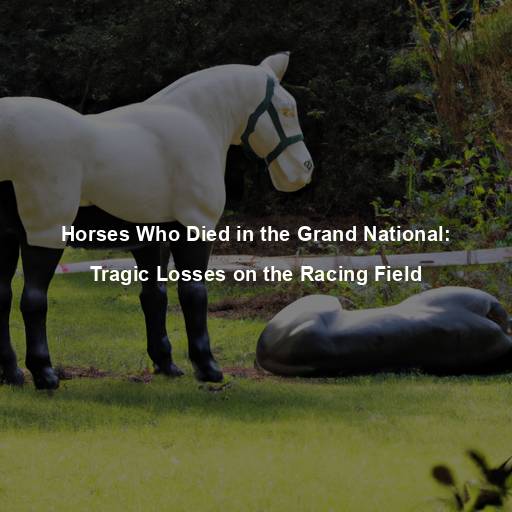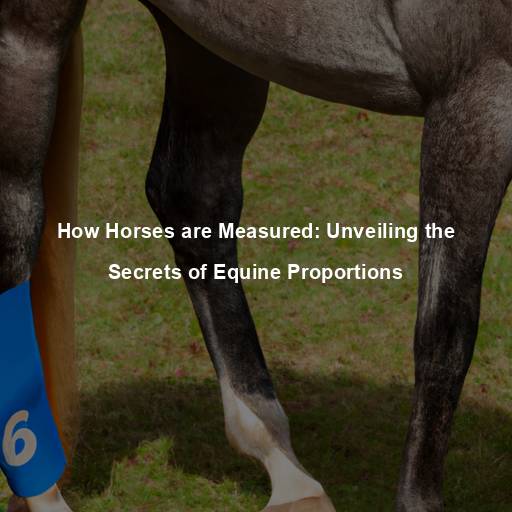The Controversial Topic of Euthanizing Horses: An In-Depth Exploration
Last Updated on August 3, 2023 by Evan
Contents
- 1 Understanding the Dilemma: Why Horses Need to be Euthanized
- 1.1 Exploring the Complexity of Euthanizing Horses
- 1.2 The Ethical Considerations Surrounding Horse Euthanasia
- 1.3 The Emotional Toll on Horse Owners
- 1.4 Seeking Professional Guidance: The Role of Veterinarians
- 1.5 Alternatives to Euthanasia: Considering All Options
- 1.6 The Importance of Open Dialogue and Education
- 1.7 A Profound Bond
- 1.8 Grief and Coping
- 1.9 The Role of Veterinarians in Euthanasia
- 2 Alternatives to Euthanasia: Considering All Options
- 3 Fostering Compassion and Understanding
- 4 FAQs – Why Horses Need to be Euthanized
- 4.1 What circumstances may lead to a horse needing to be euthanized?
- 4.2 Is euthanasia the only option for dealing with a sick or injured horse?
- 4.3 How is euthanasia carried out on horses?
- 4.4 Are there any alternatives to euthanasia for horses that are in pain but not critically ill or injured?
- 4.5 Is it possible to euthanize a horse at home?
- 4.6 What options are available for handling a horse’s remains after euthanasia?
- 4.7 Is euthanasia a difficult decision for horse owners to make?
Understanding the Dilemma: Why Horses Need to be Euthanized
Exploring the Complexity of Euthanizing Horses
Euthanizing horses is a highly debated and emotionally charged topic within the equine community. The decision to euthanize a horse is never taken lightly, as it involves making a difficult choice that affects not only the well-being of the animal but also the emotional and financial aspects of the owners and caregivers.
The Ethical Considerations Surrounding Horse Euthanasia
Euthanasia, derived from Greek roots meaning “good death,” is the practice of intentionally ending the life of an animal to prevent further suffering. When it comes to horses, this decision is often prompted by severe injuries, debilitating diseases, or old age. But why is euthanasia considered a viable option for horses?
Quality of Life
Horses, known for their magnificence and strength, thrive on spacious surroundings, regular exercise, and attentive care, all essential for their wellbeing. However, there comes a time when their health progressively declines, robbing them of the freedom to relish these vital elements. In such bewildering circumstances, euthanasia emerges as a complex yet compassionate decision, a step taken to alleviate their inevitable anguish.
Irreversible Conditions
Horses, majestic creatures that embody grace and strength, can sadly face unforeseen health challenges that jolt their entire existence. These unfortunate circumstances can thrust them into a realm of perplexity, where irreversible medical conditions cast a cloud of uncertainty. Amidst this tumultuous battle, a heartrending decision may emerge, where the ultimate act of compassion, euthanasia, becomes a consideration – a poignant choice to release them from the clutches of agonizing suffering and grant respite from the abyss of distress.
Financial Constraints
Horse ownership comes with a considerable financial responsibility. When faced with a horse suffering from a chronic or incurable condition that requires costly medical interventions, some owners may find themselves unable to afford the necessary treatments. In such cases, euthanasia might be the only viable alternative to prevent the animal from experiencing prolonged suffering due to inadequate care.
The Emotional Toll on Horse Owners
When faced with the agonizing decision of euthanizing a beloved horse, horse owners find themselves grappling with a whirlwind of emotions. These majestic creatures, with their remarkable intelligence and capacity to forge lasting connections, seamlessly integrate into the fabric of a family. Consequently, bidding farewell to a cherished equine companion becomes an intricate journey filled with heartache and turmoil.
Seeking Professional Guidance: The Role of Veterinarians
In the face of such a weighty decision, it is crucial for horse owners to seek the guidance of experienced veterinarians. These professionals possess the medical knowledge and ethical understanding necessary to assess the horse’s condition objectively and provide informed recommendations regarding euthanasia.
Veterinary Expertise
When it comes to the world of equine health, veterinarians are the unsung heroes. With their extensive training and wealth of knowledge, they possess the remarkable ability to diagnose and treat a plethora of horse-related ailments. From assessing the well-being of these majestic creatures to weighing the various treatment options, these experts navigate the complexity of equine health with grace and determination. And although it is a somber decision, they ethically grapple with the question of euthanasia, always striving to make the most compassionate choice for these magnificent animals.
Compassionate Counseling
Veterinarians, with their vast knowledge and expertise, extend their impact beyond the realm of medicine. In the realm of equine care, they possess a unique ability to offer solace to horse owners who find themselves grappling with the intensely overwhelming contemplation of euthanasia. Through their empathetic guidance and unwavering support, these remarkable individuals assist owners in untangling the intricate web of emotions, ultimately empowering them to make a choice that places the horse’s well-being at the forefront of their decision-making process.
Alternatives to Euthanasia: Considering All Options
While euthanasia may be the most compassionate choice in certain circumstances, it is essential to explore alternatives whenever possible. These alternatives can range from palliative care to rehoming efforts, depending on the horse’s specific situation and prognosis.
Palliative Care
When it comes to horses grappling with manageable conditions that don’t inflict excessive anguish, opting for palliative care can offer a glimmer of hope. This approach revolves around delivering solace and easing pain, with the ultimate goal of ensuring the horse’s twilight years are filled with sheer comfort. Nevertheless, it is paramount to consistently gauge the horse’s overall well-being and be ready to reassess the chosen path if their condition takes a turn for the worse.
Rehoming and Adoption
When it comes to a horse’s well-being, sometimes finding a new home may be the answer, especially if the issues aren’t too serious. This opens up opportunities for other horses in need as well. However, the decision to rehome a horse should not be taken lightly; it requires thoughtful evaluation of the animal’s future and the potential adopters’ capabilities. It’s a perplexing situation, but with the right considerations, burstiness can be brought to the equine world.
The Importance of Open Dialogue and Education
Welcome to our magazine, where we explore the complex and sensitive subject of euthanasia and end-of-life decisions for horses. With empathy and understanding in mind, we strive to foster open dialogue and provide accurate information that helps horse owners navigate this challenging aspect of their equine journeys. Through the sharing of personal experiences and the promotion of respectful discussions, we aim to create a supportive community that empowers individuals to make informed decisions for their beloved companions. So join us as we explore this thought-provoking topic, aiming to shed light on the perplexing terrain of equine end-of-life care.
A Profound Bond
For horse owners, the bond they share with their majestic equine companions is a profound thing, a connection that runs deeper than a meandering river. These noble creatures have an uncanny ability to forge relationships with humans that surpasses the conventional understanding of friendship, evolving into a partnership fueled by trust and mutual understanding. When the time comes for a horse to depart this earth, the weight of the decision to administer euthanasia is one that can leave owners caught in a storm of emotions, their hearts heavy with the unenviable responsibility of ensuring their cherished four-legged friend receives the best possible care in their final moments.
Grief and Coping
The grieving process for horse owners can be long and challenging. The loss of a horse can elicit a range of emotions, including sadness, guilt, anger, and even a sense of relief if the decision to euthanize was made to end the horse’s suffering. It is crucial for horse owners to allow themselves time to grieve and seek support from understanding friends, family, or support groups specializing in pet loss. Sharing their feelings and memories can help owners process their emotions and find solace in the memories they shared with their horse.
The Role of Veterinarians in Euthanasia
Open Communication
When a horse’s health reaches a critical stage, veterinarians play a vital role in providing owners with the necessary information to make informed decisions. They communicate the horse’s prognosis, potential treatment options, and the likelihood of recovery. Open and honest communication between veterinarians and horse owners is crucial in navigating the difficult decision-making process.
Ensuring a Peaceful Passing
Veterinarians strive to make the euthanasia process as peaceful and painless as possible. They carefully explain the procedure, allowing owners to understand each step and prepare themselves emotionally. Veterinarians administer medication that ensures the horse passes away without pain or distress. Being present during the euthanasia can provide comfort to both the horse and the owner, as they share a final moment together.
Alternatives to Euthanasia: Considering All Options
Palliative Care: A Compassionate Approach
Pain Management
When it comes to our beloved equine companions facing long-term or untreatable ailments, palliative care steps in, embracing the complexity of the situation. Collaborating closely with horse owners, veterinarians devise personalized pain management strategies tailored to the unique needs of each majestic creature. By integrating a mixture of medications, physical therapies, and even alternative methods, the ultimate aim is to provide relief, enhance comfort, and uplift the overall well-being of these graceful beings.
Supportive Care
In addition to pain management, supportive care aims to address the horse’s physical and emotional needs. This may involve modifications to the horse’s environment, such as providing soft bedding, ensuring easy access to food and water, and creating a calm and soothing atmosphere. Regular veterinary check-ups and ongoing monitoring are essential to adjust the care plan as needed.
Rehoming and Adoption: Finding a New Chapter
Assessing Suitability
In situations where a horse’s health issues are manageable but the current owner is unable to provide the necessary care, rehoming or adoption can be considered. However, it is crucial to conduct a thorough assessment of potential adopters to ensure they have the resources, knowledge, and commitment to meet the horse’s needs. This includes evaluating their experience with horses, the availability of suitable facilities, and their financial capability to provide ongoing care.
Collaborating with Rescue Organizations
Working with reputable rescue organizations can provide an additional layer of support when rehoming a horse. These organizations have experience in assessing potential adopters, conducting home visits, and ensuring the horse’s well-being throughout the rehoming process. Collaborating with such organizations can increase the likelihood of finding a safe and suitable forever home for the horse.
Fostering Compassion and Understanding
Education and Awareness
To address the complexities surrounding horse euthanasia, education and awareness are essential. Horse owners should strive to expand their knowledge of equine health, well-being, and end-of-life care. This can be achieved through attending workshops, seminars, or online courses, as well as engaging in discussions with veterinarians, experienced horse owners, and equine professionals.
Supportive Communities
In this complex and often delicate topic of euthanasia, the need for nurturing and inclusive communities cannot be overstated. It is paramount that horse owners find solace in spaces where they can bravely open up about their journeys, express their worries, and seek advice. With the rise of online platforms, from forums to social media groups, harnessing the power of connection has become more accessible, allowing individuals to forge meaningful relationships, share their narratives, and extend compassionate support to one another. Moreover, these communities serve as invaluable pools of knowledge, offering a wealth of information, guidance, and recommendations, guiding horse owners through the perplexing realm of euthanasia.
Ethical Considerations and Evolving Perspectives
The ethical considerations surrounding horse euthanasia continue to evolve as our understanding of equine welfare and veterinary practices advances. It is important for horse owners and the broader equine community to remain open-minded, receptive to new information, and willing to adapt their perspectives as necessary. By staying informed and engaging in respectful dialogue, we can collectively work towards better outcomes for horses and their owners.
FAQs – Why Horses Need to be Euthanized
What circumstances may lead to a horse needing to be euthanized?
The decision to euthanize a horse is a complex and heart-wrenching one, with numerous factors at play. These can range from devastating injuries or untreatable illnesses that leave no alternative, to relentless chronic pain that defies control. Sometimes, advancing age takes its toll, plunging the noble creature into a life of diminished joy and vitality. In other cases, behavioral problems rear their perplexing heads, posing risks that cannot be ignored for the horse and those who care for it.
Is euthanasia the only option for dealing with a sick or injured horse?
When it comes to the difficult decision of how to address the health of an ailing horse, euthanasia is not always the sole choice on the table. Instead, there may exist circumstances in which treatment or surgery could present a glimmer of hope for recovery. Yet, the final verdict lies in the hands of qualified veterinary experts, who undertake the arduous task of gauging the horse’s condition, considering factors such as prognosis, overall well-being, and the possibility of anguish. If the horse’s agony and distress cannot be alleviated, euthanasia may emerge as the kindest and most compassionate path to embrace.
How is euthanasia carried out on horses?
When it comes to the delicate subject of euthanasia in equines, veterinarians rely on a powerful drug called pentobarbital to provide a peaceful and painless departure. Administered intravenously, usually via injection, this medication swiftly ushers the horse into unconsciousness, ultimately leading to a cessation of breathing and the stilling of their once-beating heart. The swiftness of this process ensures a serene passage, sparing the animal any unnecessary suffering.
Are there any alternatives to euthanasia for horses that are in pain but not critically ill or injured?
When faced with a horse experiencing discomfort, one may find solace in knowing that there are alternative avenues to explore. These pathways encompass an array of pain management protocols, ranging from medications to therapies, all designed with the noble intention of enhancing the equine’s comfort. It becomes crucial to forge a tight-knit relationship with a knowledgeable veterinarian, as this alliance will serve as the cornerstone in creating a tailored care plan that factors in the distinctive needs and circumstances of the noble steed.
Is it possible to euthanize a horse at home?
In some cases, euthanizing a horse at home may be possible. However, it is crucial to consult with a veterinarian beforehand to ensure the procedure is carried out safely and effectively. Veterinarians have the necessary expertise and equipment to perform euthanasia properly, minimizing any potential pain or distress for the horse.
What options are available for handling a horse’s remains after euthanasia?
After euthanasia, there are several options for handling a horse’s remains. Depending on local regulations and personal preferences, options may include burial on the owner’s property, cremation, or arranging for the horse to be collected by a rendering service. It is important to check local regulations and consider factors such as environmental impact, costs, and emotional considerations when making this decision.
Is euthanasia a difficult decision for horse owners to make?
Euthanasia is undoubtedly a difficult decision for horse owners to make. Horses often hold a special place in their owners’ hearts, and making the choice to end their suffering can be emotionally challenging. However, it is also a responsible and compassionate decision made to prevent further pain or distress. Consulting with a veterinarian, seeking support from other horse owners or equine professionals, and considering the welfare of the horse can help owners navigate this difficult decision-making process.







